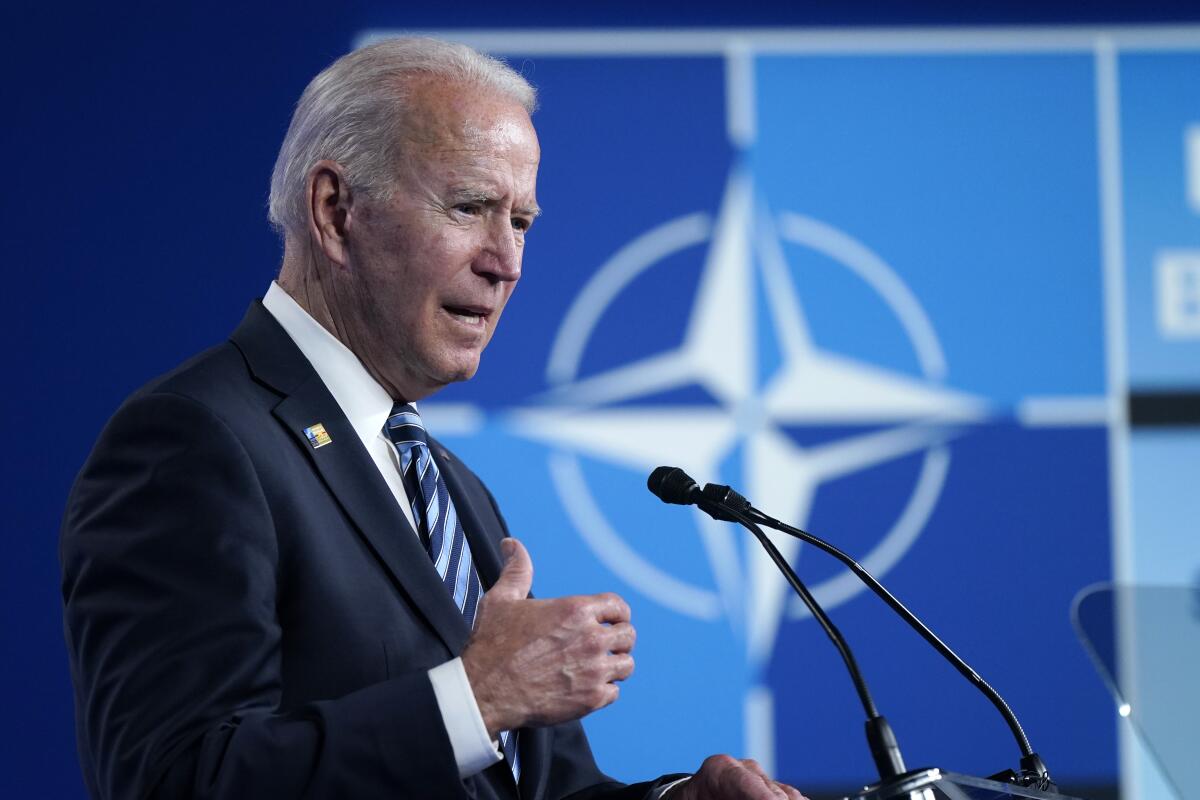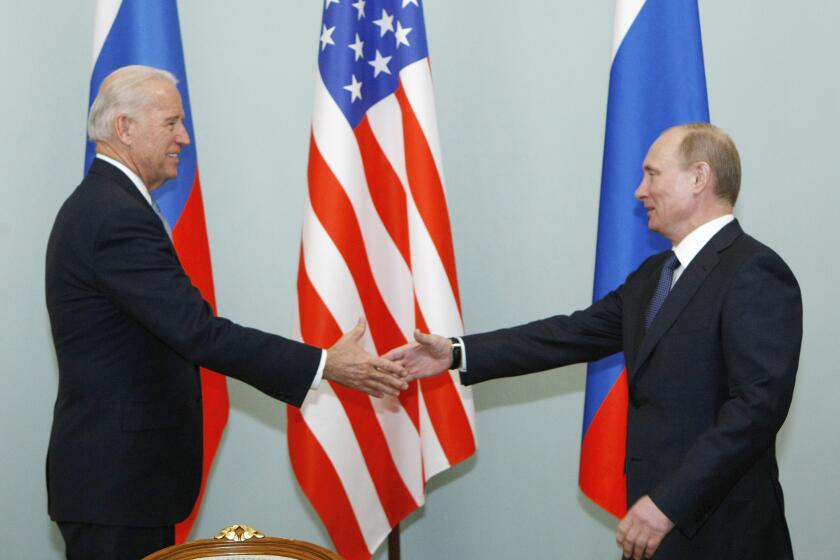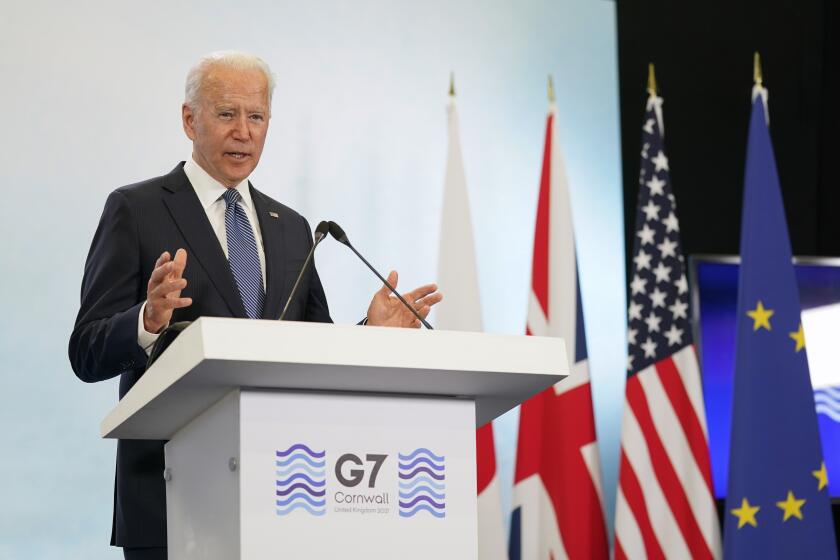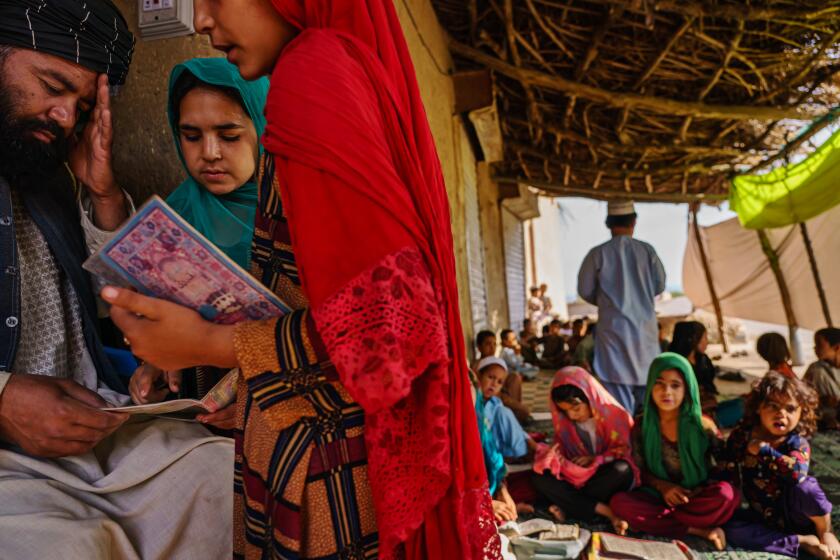‘Watch me.’ Biden assures NATO allies after Trump mocked alliance as ‘obsolete’

BRUSSELS — It took most of his term for former President Trump to grudgingly acknowledge the most fundamental tenet of the NATO transatlantic bond: An attack on one is an attack on all, and all will join in the defense of one.
The only time that the Article 5 provision was invoked was when NATO member states rushed to support the United States after the Sept. 11, 2001, terrorist attacks. But Trump, who once branded NATO “obsolete,” wondered out loud why he should send U.S. troops to defend countries he apparently had barely heard of.
Into that sense of unease stepped President Biden on Monday. As he has sought to do elsewhere on his first overseas trip as president — starting with sessions with the Group of 7 wealthy democracies Friday — Biden is trying to repair critical ties with the North Atlantic Treaty Organization, an alliance that has worked to preserve global peace since World War II.
And Biden claimed initial success. “Everyone in that room today understood the shared appreciation that, quite frankly, America is back,” Biden said in a late night news conference in Brussels following his meetings with about 30 NATO member leaders.
“What I’m saying to them is, watch me,” he said when pressed about global doubts over U.S. dependability after the chaotic Trump years. He acknowledged he got an earful from some allies, who said they were “shocked” at the Jan. 6 Capitol riot by a pro-Trump mob attempting to stop certification of the presidential election.
“They, like I do, believe the American people are not going to sustain that type of behavior,” Biden said, attempting to reassure the world that the fallout from Trump’s lies about his electoral loss were a short-term phenomenon.
“I think this is passing — I don’t mean easily passing — that’s why it’s so important for me to succeed in my agenda,” Biden told reporters.
Biden also said NATO allies supported his decision to meet with Russian President Vladimir Putin later this week.
Biden and Putin agree the nations’ relationship is at a low point before their summit. Trump sends the ex-KGB chief ‘warmest regards.’
Earlier in the day, Biden met with NATO Secretary-General Jens Stoltenberg and reassured him that the organization’s mutual defense pact was “a sacred obligation” and mentioned how “NATO stepped up” after the Sept. 11 attacks. He added: “I want NATO to know America is there.” Biden later visited a 9-11 memorial at NATO headquarters.
Stoltenberg said the summit would be “a new chapter in our transatlantic relationship.”
“A strong NATO is good for Europe, but it’s also very good for America,” he said.
As expected, Biden encouraged the alliance to expand its mandate to include confronting China, a significant shift after decades in which Russia’s role as a regional adversary was NATO’s raison d’etre.
Although some European nations do not share Washington’s enthusiasm for going against Beijing, Biden’s national security advisor, Jake Sullivan, described it as an important next step for the alliance.
“NATO speaking out powerfully about the common purpose and common strength of democracies is an important part of a collective effort to be able to meet the China challenge over the decades ahead,” Sullivan said.
NATO’s new communiqué, issued on Monday to summarize the alliance’s latest priorities, reflected the shift.
“China’s growing influence and international policies can present challenges that we need to address together as an Alliance,” the document said.
Before traveling to Brussels, where NATO and European Union headquarters are, Biden drew a clear distinction between himself and Trump, whose threat to withdraw the U.S. from the organization if other members didn’t immediately boost defense spending threw the last NATO summit in 2018 into disarray.
“We do not view NATO as some sort of a protection racket,” Biden said Sunday at a news conference at the Cornwall Airport Newquay in southwestern England.
President Biden and other G-7 leaders condemn forced labor and call out China and others for human rights abuses.
“We feel very, very strongly about the cohesion of NATO,” Biden said a day earlier as he met with French President Emmanuel Macron, who is emerging as the first among equals in Western Europe leadership as German Chancellor Angela Merkel prepares to retire.
But Biden also must confront strains with NATO of his own administration’s making or, at least, responsibility.
Trump, without consulting NATO, abruptly announced he was withdrawing U.S. troops from Afghanistan after nearly two decades. He did not fulfill that pledge, but Biden has vowed to proceed, ending the U.S. military presence in his country’s longest war by Sept. 11, the 20th anniversary of the terrorist attacks that killed nearly 3,000 people in New York, Washington and Pennsylvania. Then-President George W. Bush ordered the invasion of Afghanistan to pursue Al Qaeda leader Osama bin Laden, mastermind of the attacks.
NATO forces have accompanied U.S. troops during most of the Afghan operations, and are acknowledging that they cannot sustain a presence without the U.S. There is mounting fear that once the foreign troops depart, the Taliban will move to retake control of most of Afghanistan, unleashing civil war and a reversal of the bare rights gained in recent years by women, minorities and others.
As U.S. forces pull out from Afghanistan, the Taliban is in the ascendant — and threatening to retake the city that was its former spiritual capital.
NATO is wrestling with other thorny issues as it contemplates its own future efficacy, including climate change, which Stoltenberg says poses a major threat to the alliance’s military capability and readiness; Russian aggression against countries on NATO’s eastern flank such as Ukraine and Georgia; and defense spending, which member states have pledged to increase and have, in many cases.
During the Obama administration, NATO members agreed to raise domestic defense spending to 2% of their national budgets by 2024. Trump demanded it happen more quickly, and some countries have complied; others, including Germany, continue to lag, arguing that they should receive dispensation because much of their spending goes to the resettlement of refugees created by armed conflicts.
NATO is also confronting problematic relations with member nation Turkey, which has moved closer to Russia and purchased Russian air-defense materiel that Western experts say might allow Moscow to spy on NATO weapons systems. Biden met separately with Turkish President Recep Tayyip Erdogan on the margins of the NATO session.
Many NATO officials are alarmed at democratic backsliding in some states in the alliance.
Democratic freedoms and rule of law, enshrined in the NATO charter, “are being upheld unequally across the alliance,” Rachel Ellehuus, a Europe and Russia expert at the Center for Strategic and International Studies, said in a panel discussion ahead of Biden’s trip.
Countries including Hungary and Poland have cracked down on dissidents, journalists and news media outlets.
“The deficit in internal NATO values is also an external security threat,” Ellehuus said.
Biden’s next stop is Geneva, where he’s scheduled to meet with Russian President Vladimir Putin. The administration is stressing that affirming U.S. alliances in multiple venues — NATO, the EU and the G-7 — will strengthen Biden’s hand as he heads into what will be the most challenging encounter of the trip. Biden said Monday that allies supported his meeting with the strongman.
“The president’s not coming into this meeting with President Putin in a void,” Secretary of State Antony J. Blinken, who is accompanying Biden, said on Fox News Sunday.
“What we’re demonstrating in each of these meetings and summits is that democracies can come together and work effectively to actually deliver results for our people and, by the way, for people around the world,” Blinken said. “And also, when we’re working together militarily, economically, diplomatically, politically, we’re a very powerful force.”
Stokols reported from Brussels and Wilkinson from Washington. Times staff writer Chris Megerian contributed from Washington.
More to Read
Get the L.A. Times Politics newsletter
Deeply reported insights into legislation, politics and policy from Sacramento, Washington and beyond. In your inbox three times per week.
You may occasionally receive promotional content from the Los Angeles Times.















